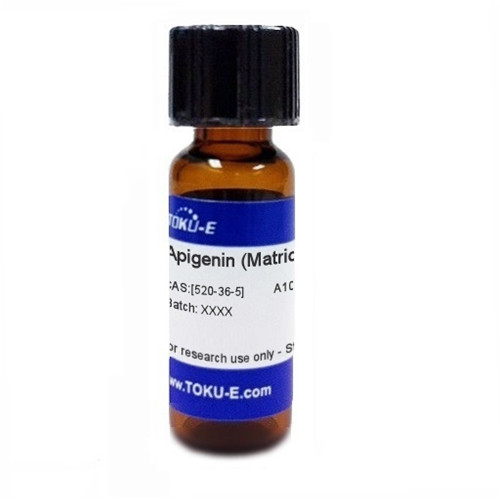Apigenin (from Matricaria recutita) is a natural occurring, ubiquitous, low molecular weight plant flavone with low toxicity and is the most bioactive of the plant flavones. It belongs to the flavonoid subclass and has antioxidant, anticancer, immunomodulatory, and anti-inflammatory properties. M. recutita (chamomile) is a medicinal plant containing more than 120 chemical metabolites and Apigenin has been reported to be a biomarker of M. recutita. The name Apigenin is derived from the Apium genus in the Apiaceae family. Apigenin affects several critical pathways and/or targets which are associated with several health disorders including cancer.
Apigenin is soluble in organic solvents such as ethanol, DMSO and DMF but sparingly soluble in aqueous buffers.
| Mechanism of Action |
Apigenin exerts a broad range of molecular signaling effects. Apigenin is an ornithine decarboxylase inhibitor, which is involved in tumor growth and production. Polyphenols may affect the molecular events involved in initiation, promotion, and progression stages of carcinogenesis. Apigenin also has been shown to inhibit nitric oxide synthase-2 and cyclooxygenase-2 activity in mouse macrophages. Apigenin has been shown to increase the intracellular concentration of glutathione, enhancing the endogenous defense against oxidative stress. |
| Eukaryotic Cell Culture Applications |
Apigenin exerts a broad range of molecular signaling effects. Apigenin is an ornithine decarboxylase inhibitor, which is involved in tumor growth and production. Polyphenols may affect the molecular events involved in initiation, promotion, and progression stages of carcinogenesis. Apigenin also has been shown to inhibit nitric oxide synthase-2 and cyclooxygenase-2 activity in mouse macrophages. Apigenin has been shown to increase the intracellular concentration of glutathione, enhancing the endogenous defense against oxidative stress. |
| Cancer Applications |
There is considerable potential for Apigenin to be developed as a cancer chemopreventive agent, and it impacts numerous essential pathways and targets associated with cancer. Apigenin has shown promise in inhibiting tumor cell invasion and metastases by regulating protease production (Lindenmeyer et al, 2001). |
| Heavy Metals | Not more than 10ppm Arsenic: Not more than 2ppm |
| References |
Fejemiroye JO et al (2016) Matricaria recutita and its isolate-Apigenin: Economic value, ethnopharmacology and chemico-biological profiles in retrospect. Res Rev.: J. Pharmaog. Phytochem. eIISN: 231-6182 p-ISSN: 2347-2332 Kuo ML, Lee KC, Lin JK. (1992) Genotoxicities of nitropyrenes and their modulation by Apigenin, tannic acid, ellagic acid and indole-3-carbinol in the Salmonella and CHO systems. Mutat. Res. 270(2):8-95 PMID 1383740 Lee SF, Lin JK (1997) Inhibitory effects of phytopolyphenols on TPA-induced transformation, PKC activation, and c-jun expression in mouse fibroblast cells. Nutr Cancer 28:177–183 PMID 9290125 Lindenmeyer F, Li H, Menashi S, Soria C, Lu H (2001) Apigenin acts on the tumor cell invasion process and regulates protease production. Nutr. Cancer. 2001;39:139–147 PMID 11588896 Middleton E Jr, Kandaswami C, Theoharides TC (2000) The effects of plant flavonoids on mammalian cells: Implications for inflammation, heart disease, and cancer. Pharmacol. Rev. 52(4):673-751 PMID 8895505 Miguel FG et al (2015) Validation of a RP-HPLC-DAD Method for chamomile Matricaria recutita: Preparations and assessment of the marker, Apigenin-7-glucoside, safety and anti-Inflammatory effect. Evidence-Based Compl. Alt. Med. 828437 9 pp. Plaumann B, Fritsche M, Rimpler H, Brandner G, Hess RD (year) . Flavonoids activate wild-type p53. Oncogene. 1996;13:1605–1614 PMID 8895505 Shankar, Eswar et al (2017) Plant flavone Apigenin: An emerging anticancer agent. Curr, Pharmacol. Rep. 3(6): 423-446 Shukla S and Gupta S (2010) Apigenin: A promising molecule for cancer prevention. Pharm. Res. 27(6): 962-978 PMID 20306120 Yang CS, Landau JM, Huang MT, Newmark HL (2001) Inhibition of carcinogenesis by dietary polyphenolic compounds. Annu Rev. Nutr. 21:381-406 PMID 11375442 Viola H et al (195) Apigenin, a component of Matricaria recutita flowers, is a central benzodiazepine receptors-ligand with anxiolytic effects. Planta Med. 61(6):213-216 PMID 7617761 |




